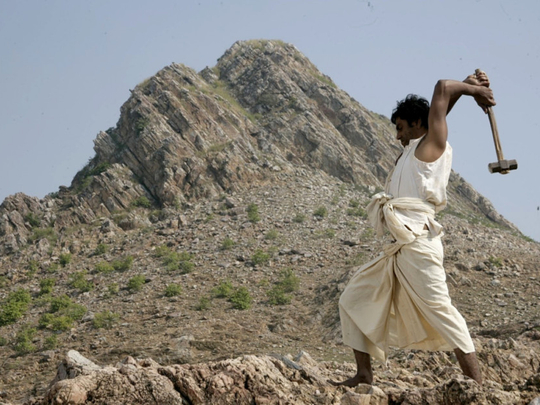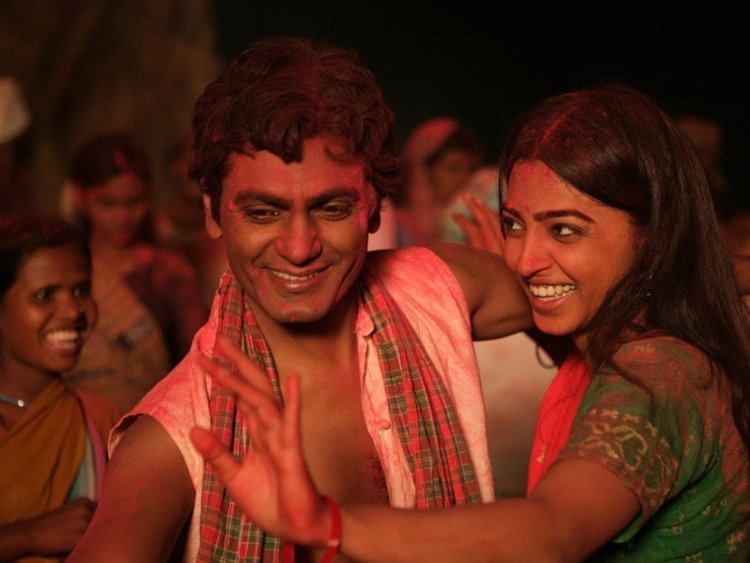
In one of the many heart warming scenes in Manjhi — The Mountain Man, Dashrath Manjhi (Nawazuddin Siddiqui) tries to convince Phaguniya (Radhika Apte) to elope with him. To make his offer more enticing, he gives her a miniature Taj Mahal. “He built it to remember the love of his life,” he tells her. “What? This small?” she asks, jokingly. “No,” responds Manjhi, “The real one is as big as those mountains.”
It’s a brilliant analogy. Manjhi would later spend 22 years of his life digging through those very mountains in Phaguniya’s memory, after she slips and dies in a hospital because there were no proper roads to take her in time to the nearest hospital.
Director Ketan Mehta, who’s made quite a career with biopics — on Indian freedom fighters Sardar Vallabhai Patel (Sardar, 1993) and Mangal Pandey (Mangal Pandey: The Rising, 2005), and Rang Rasiya (2014), on the life of the 19th century Indian painter Raja Ravi Varma — takes on the task of bringing Manjhi’s story to life.
The film focuses on how, two decades and many sacrifices later, he managed to carve a 109-metre path through a rocky mountain (Manjhi was given a state funeral when he died in 2007).
Shot entirely on location in Gehluar, the same remote village in Gaya, Bihar, in north India, the film is a gritty re-telling of Manjhi’s inspiring story.
Biopics can be quite dull. But Mehta, who shares writing credits with Jakhar Mahender, manages to craft a gripping story about a man who sets out on an impossible task. They do that by using multiple flashbacks, only occasionally returning to the scene of Manjhi hammering through rocks day in and day out. They focus, instead, on life in his small village in Bihar of the ’60s, where post-independence fervour was slowly seeping in, but where the caste system was thriving and corrupt village heads took advantage of the simple village folk. All very nicely told.
But it’s not all smooth sailing, as Mehta occasionally falls into typical Bollywood traps, especially while building Manjhi and Phaguniya’s relationship. They often almost break into song as they are framed in slow-motion, and when Manjhi steals her on her wedding day, it’s so overly dramatic that you can’t help but question if it was only added for the drama. But these are just minor kinks in an otherwise good film.
Apte, as Manjhi’s wife, is a natural. She is a joy to watch and easily convinces us why Manjhi’s resolve to break the mountain in her memory is worth it. The late Ashraf ul Haque was rather miscast as Manjhi’s father, as he looked much younger than the two leads despite his make up. Siddiqui, arguably one of the finest actors in the industry today, owns Manjhi’s character through and through. He is not a beat out of sync as he transitions from a bumbling villager to a man with steely resolve; he is without doubt worthy of all the praise he’s received, and more.
Dashrath Manjhi had to overcome many challenges: a father who constantly reminded him to earn an honest living ‘like everyone else’, a father-in-law who refused to give him his daughter’s hand in marriage, a system where higher-caste gangsters are allowed to loot, rape and kill at will. Even when his story finally gets out and the government initially sanction money to help him build a road, he loses everything to bureaucracy. Yet he returned daily to the mountain and slowly chipped away at it for two decades until he carved a path.
It’s an universal story of resolve, of being the change you want to be and of winning against all odds. That’s why it’s a story worth watching and telling.
Don’t miss it
Film: Manjhi — The Mountain Man
Cast: Nawazuddin Siddiqui, Radhika Apte
Stars: 3.5 out of 5
Manjhi — The Mountain Man is available with etisalat’s eLife via its On Demand service.










